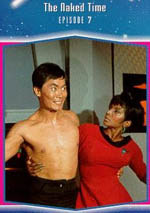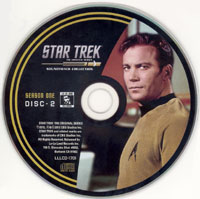The Naked Time
This story often just leaves me scratching my head, unsure exactly what to
make of it. There's a bit of fun to be had watching the crew interact in
this episode, while half of them slowly go a bit bonkers. But it often fails
to feel like it is about anything of significant interest. It sort of just says,
"Well, here are our regulars. Let's see what trouble they can get into today...."

|
It seems there are those who feel that the regular characters are getting
better defined via this story, as a form of drunkenness peels back the surface
layer of each onion to reveal a deeper layer. Okay, that's not inherently
a bad idea. The real trouble here is that Star Trek is pulling the trigger
on this idea way too soon by doing this episode so early in its run.
There's so much still to be explored concerning the surface level of the characters,
and the subtle interpersonal tensions that could be hinting at further depths.
By attempting to go this deep so soon, most of the revelations we get fall flat
and appear meaningless. Do we really care if Riley is an Irish chauvinist at heart?
We've never even seen this guy before. Sulu likes to fence and pretend to be one
of the three (four) musketeers. Okay. So what? The episode seems desperate
to answer all those niggling character questions that the series has
not yet had time to think of, let alone ask.
|
As if producing this as the 7th episode wasn't already too early, it then got pushed up
to air 4th, and even that was a consolation prize for those considering that
it should air first. Ay caramba, no! But yes, this concept can only get less
satisfying the earlier it is done, as well evidenced by Star Trek: The Next Generation
and its roster of brand new characters when they produced a nearly carbon-copy
sequel as their second show and aired it right after the debut of their pilot.
What is additionally interesting is the fact that a different perception bubbled
up as original Star Trek was shown in syndication, all episodes re-run over and
over again in a loop. People lost sight of how incredibly early this story
was attempted, and began to assume it belonged to a later point, when the time
for revelation was more ripe. Even the writer's wife, a production secretary
at the time, says in her DVD interviews that Nurse Christine Chapel had
been completely job-focused in previous episodes. But of course, we all know
that Nurse Chapel did not exist in previous episodes - this is her debut! Oops.
I've become convinced that Nurse Chapel began life as a one-off guest character
in the script for episode 10. When Majel Barrett saw the role, and whispered
in Gene Roddenberry's ear that she wanted it, he decided the character should
become a regular, and commanded writer John D.F. Black to retroactively insert
her character into episode 7 here. But it's not like she was job-focused in
episode 10 either; she spends all of her time in that episode mooning over the
eccentric guest star, so her revelation of mooning over Spock here is more
of an absent-minded fresh splash rather than an intriguing twist. Hmmph.
In retrospect, both of her crushes diminish in strength and importance
because she flips so totally between them in such a short space of time.
It makes one less likely to take her feelings seriously in either case.
So... the lasting character bits we get here don't really amount to much other
than seeing which characters have romantic inclinations towards each other....
I'd say that goes equally well for the version on "The Next Generation" as
it does on this one.
If there's anything else clamouring for attention, trying to pass itself off
as great character material here, it's probably the episode's attempt to see
what's in the heart of Mr. Spock.
This suffers mixed fortunes as well. First off, I'd be hard pressed to say that
we actually learn anything NEW here - it seems instead that everything we already
know about Spock from the previous 6 episodes
is being reiterated and reinforced in the space of a couple of
not-so-great scenes. Now, if you're an adult, you may be able to empathize
with Spock during his response to Nurse Chapel. Seeing this as a child, it was
just baffling and uninteresting. But even worse was the scene of Spock ducking
into the conference room and bawling his eyes out. Children can be quite
disturbed to see a strong and respected adult figure break down and burst into
tears like this, and worse yet if there seems to be no good reason for it.
Everytime this episode came back in re-runs, it would get to the point where
I'd recognize it and think, "Oh no, not the one where Spock cries... again!"
Yes, I can understand it much better now, but I still don't really like it.
It's very hard to pull off from an acting standpoint, and the camera angles
and movements really put unnecessary extra pressure on Nimoy to deliver all the goods
in long takes. He probably could have used a few extra attempts and/or
some angles that allowed intercutting of the best bits, but I'm sure time
was against him and the rest of the crew here. What we end up with remains one of
my least favourite moments of Spock ever.
But perhaps this is the best time to look at the overall arc of episodes
dealing with the tensions between Kirk and Yeoman Rand. Rand is quite unique
amongst all of Kirk's potential love interests, because she's the only one of the
entire extensive lot who manages to appear in more than one story - and as such
she's about the only one I'd be prepared to emotionally invest in and root for
as an audience member. We get pretty much the best Kirk-Rand romantic moment
of the entire franchise here,
as Kirk gives her a wistful look on the bridge, regretfully muttering
"No beach to walk on..." Enigmatic enough that she doesn't clue in to its meaning,
but we the audience have heard the full rant from Kirk earlier and know exactly
what it means. A nice moment, and pretty much the best that these two ever get.
And this story does have a lot of nice, memorable scenes in it which I enjoy.
No one will ever forget swashbuckling Sulu once they've seen this one.
And commendations are probably in order for both Dr. McCoy and Engineer Scott,
as they stay on the ball the whole time, deliver excellently in all their scenes,
and have crucial roles to play in saving the ship. Good show guys.
And for a primarily ship-board show, it is good that we open in a frozen base
on an ice-planet, getting some design contrast right up front in the story.
Too bad our improved modern picture resolution makes the mannequin-as-dead-body
so obvious, but otherwise the scene still works excellently. Design also comes up
trumps in another important way, as the Jefferies Tube makes its debut and
adds itself to the standing sets of the Enterprise. And thanks to crewmember
Riley, this show features some singing - usually a cause for a minus point from me,
but it's delivered charismatically and in proper character, and works well enough
when buried in a distant echo.
|
The main score for this episode also deserves mention. The varied emotions of
the characters and tones of the individual scenes may have prevented the story itself
from gelling as a focused narrative, but it sure did give Alexander Courage
a wide range of ideas to try to convey musically, resulting in one of the richer
and more heavily re-used scores of the first season. From Irish jigs,
to playful swordsmanship, forlorn longing, tense action, mystery,
and a final falling into a temporal abyss, this score really ran the gamut.
Although I think "The Cage" remains Courage's best for first season,
"The Naked Time" is definitely his next in line for great honours.
|
|
|
The story's drama does manage to build successfully, despite its subject matter
being quite all-over-the-place. And then, post-climax in the coda, we get
a bit of an unrelated surprise. In actual fact, the episode has merely hit
a simple reset button for its characters, arbitrarily getting them back to their
starting positions so that the episode can be shuffled into any random order the
networks desire, although the collection of unique events we have had are all
definite and solid, with the characters taking them along in their memories
along with everything they may have learned about themselves and each other.
Yet they begin to fantasize that the reset-button was something more than that.
No, it wasn't. But we'll get to the full ramifications of this unnecessary
tacked on coda in full when we get to
our big Star Trek Time Travel article
closer to episodes 21 and 28.
When all is said and done, I'd classify "The Naked Time" as having a fairly
neutral ending, neither particularly upbeat nor downbeat.
"The Naked Time" is a decent episode, with a lot of really great scenes in it
alongside a few cringe-worthy stinkers. Ultimately this is not a bad episode at all,
but it does feel a bit de-focused and devoid of any really significantly
interesting main point. Not great, but not bad for a seventh episode.
Read the next Star Trek review:
"Charlie X"
|
|
















